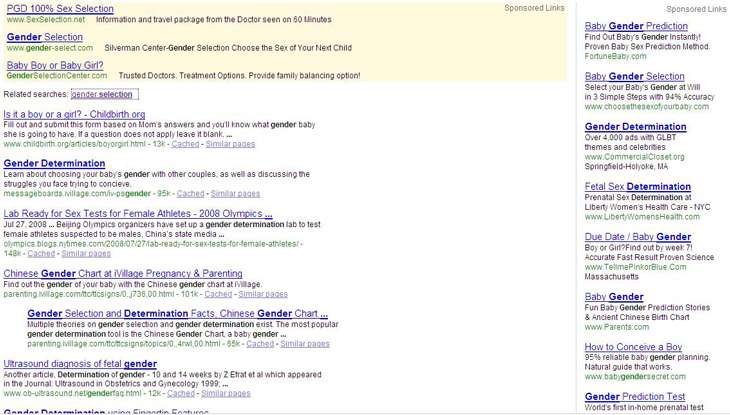
Google, Microsoft and Yahoo need to explain themselves. The Supreme Court has shamed all three for carrying advertisements that encourage pre-natal gender selection tests. This is, of course, in complete violation of Indian laws.
The companies that own top search-engines in the market also feature sex-selection ads above and over relevant search results. And that hasn't gone down too well with the SC.
Also read - Well done Haryana! Sex ratio in the state crosses 900 mark
"They are patently violating the law and saying that that they cannot do anything to block such advertisements. It is not acceptable and the government must devise a mechanism to block advertisements," the judges accused.
But what is the law?
The law, Preconception and Prenatal Diagnostic Techniques Act (PCPNDT Act 1994), was reformed in 2003 to target the medical procedures that go into sex selection. Despite that, UNICEF data from May 2006 shows that 22 out of 35 states in India had not reported even one example that violated the act.
Of those who did report it, Delhi had the highest number of cases - 76, of which 69 were unregistered births, Punjab reported 67 cases while Gujarat recorded 57. Yet statistics total up to as many as half a million female foetuses being aborted every year. One can only imagine where the figures would stand if all cases were reported.
Also read - The Surrogacy Debate: sorry folks, we are not renting our wombs any more
The Bombay High Court had earlier upheld an amendment to the PCPNDT Act banning the process of sex selection. It elevated the offense of carrying out the procedure of determining sex to be as problematic as female foeticide itself. The court also observed that it was in violation to the female right to life, whose violation, as a fundamental right, is inherently against the Indian Constitution.
In such a scenario, where the problem of sex-selection resulting in foeticide is so common, the oversight on the companies' part is beyond callous. What makes it worse is that this is a booming industry - one that the search engines are catering to with their complacency. According to the UNICEF report, the practice is so rampant that sex selective abortion is a Rs 1,000 crore industry in India today.

The companies' response
The companies have explained that they cannot block all keywords as it then removes content related to individual words in the key phrases. For example, since the Search Engine Optimisation (SEO) catches phrases, to remove "sex selection" would mean to remove "sex". And removing "sex" can only mean search engine suicide.
They further argue that the ads don't exactly violate the laws, namely the PCPNDT Act. That they do not abet to sex discrimination, even though they expressly state that you can 'pick your child's sex'. And they see the order as a form of "pre-censorship and information blocking".
To this, the SC says if you can't stop it, get out of the market.
The SC judges said, "You have to abide by the law. You can't say that you are not technically equipped. If you say you are, 'get out of the market."
The apex court has further asked the government to intervene by blocking "illegal advertisements". The court also demands that within a 10-day deadline there be a meeting of technical experts to resolve the issue.
Also read - Fatwa issued against female foeticide by Islamic seminary Darul Uloom Deoband
Is censorship valid?
The basic function of a search engine is to provide the information sought. While the ban may remove ads, it ideally wouldn't remove the search results. And if it removes search results on the basis of SEO, that's a problem.
It's a problem because the basic premise of a search engine is to provide answers. It can tell you steps to make a bomb just as easily as providing saree tutorials. Banning a particular kind of search result would set the example that banning information is okay.
Also read - Unlikely warrior: the male face of women's lib in Khap country
Sex determination is not okay, by any stretch of the imagination. However, parents can check the well-being of the child, and fortunately or not, the means to gather the information in some cases is the same. Yes, advertising such tests is to say "check out this cool new thing", but banning them can be just as dangerous.
The logical step here would be to put the moral responsibility on Google, Microsoft and Yahoo and demand plausible solutions from them. Since they evidently know the technology and can manipulate it best.
First published: 7 July 2016, 5:26 IST







![BJP's Kapil Mishra recreates Shankar Mahadevan’s ‘Breathless’ song to highlight Delhi pollution [WATCH] BJP's Kapil Mishra recreates Shankar Mahadevan’s ‘Breathless’ song to highlight Delhi pollution [WATCH]](https://images.catchnews.com/upload/2022/11/03/kapil-mishra_240884_300x172.png)

![Anupam Kher shares pictures of his toned body on 67th birthday [MUST SEE] Anupam Kher shares pictures of his toned body on 67th birthday [MUST SEE]](https://images.catchnews.com/upload/2022/03/07/Anupam_kher_231145_300x172.jpg)



_in_Assams_Dibrugarh_(Photo_257977_1600x1200.jpg)


